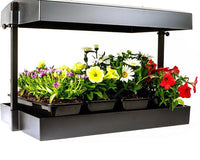You don’t want ants ruining your picnic or mimes and pooping dogs ruining your walk through a local city park. Right? Nobody wants insects or other pests to ruin their garden or grow either. These are fundamentals.
Some growers don’t want nasty industrial chemical pesticides in their plants either.
We want to tell you about a few of the greatest organic and natural pesticide products that are highly effective against insect pests. Some of them in this list are even friendly to bees and butterflies.
Pest insects not only eat or directly ruin your crops. They also spread nasty stuff like spores and bacteria. Here’s how to keep them away.
Neem Oil
Neem oil kills and repels insects. It also kills and prevents most fungi, bacteria, and powdery mildew.
None of these things can build a genetic resistance to neem oil either.
Neem oil is great for controlling pests like:
- Thrips
- Spider mites
- Aphids
- Beetles
- Caterpillars
- Leafminers
- Sawfly larvae
- Mealybugs
- So much more
It stops insect mating and the ability to communicate sexually. It can also stop young insects from becoming adults.
Neem oil not only controls pests. It is also the best leaf polish because it does not interfere with photosynthesis or plant respiration (or transpiration if you prefer) processes.
Neem is slightly toxic to fish and barely toxic to pollinators and humans. It won’t kill you or the butterflies.
Dyna-Gro Neem Oil Leaf Polish – which we have available for sale in Grow Supply Shop’s inventory - is just neem oil, despite its fancy schmancy name. It’s easy to use and fully biodegradable.
Citric Acid
Citric acid is safe for humans, other animals, and plants. It is not safe for insects. In fact, insects cannot build genetic resistance to it either.
Better yet, it does not affect the taste or smell of the crops. It’s also EXTREMELY cost effective.
You can apply it to leaves or do a root drench.
Citric acid will kill:
- Citrus mites
- Broad mites
- Spider mites
- Russet mites
- Powdery mildew (one of the top cannabis killers)
- Downey mildew
- Fungus gnats
- Thrips
- Aphids
- Root aphids
- Fusarium
- Tomato blight
But…
Make sure you get the correct type of citrus acid!
Citric acid comes from three sources:
- Foods like citrus fruits
- Yeast fermentation
- Mold fermentation
Most citric acid you find in foods is actually produced by fermentation and added to the foods. It’s not always natural or organic-friendly because some manufacturers use genetically modified molds to produce it.
Big Time Exterminator by Hydrofarm is a yeast-based citric acid formula that can be applied to organic crops without ruining any organic certifications. It kills not only insects, but also molds and mildews.
Big Time Exterminator is highly concentrated. Just one gallon can make 400 gallons of ready-to-use solution.
The concentration is .05% Citric Acid.
Inert Ingredients:
- 0.01% Potassium Sorbate
- 74.08% Yeast/Enzymes
- 24.86% Filtered Water
Big Time Exterminator breaks down into inert components after 48 hours, so pollution is not an issue. You can find Big Time Exterminator at this link.
Pyrethrum
Pyrethrum is a natural extract of chrysanthemum flowers. It’s an excellent contact killer whether you spray common insects directly or apply them to plants. It kills common flying and crawling insects that frequent gardens and homes.
When you treat your plants with this stuff, it will flush hiding insects out of your plants. Then you can either spray them for an instant kill or just let them try to mess with your plants again. They’ll die either way.
Like other botanical (plant-based) pesticides, pyrethrum biodegrades easily.
Don’t confuse pyrethrum with pyrethrins.
Pyrethrins have similar effects as pyrethrum. A major difference is that they are the six refined esters (active molecules) of chrysanthemum rather than extracts. Synthetic pyrethrins are called pyrethroids.
Pyrethrum is the most natural substance of the three. All three substances can kill pollinators and fish. Keep that in mind. Keep your pets out of it, too.
The pyrethrum we carry at Grow Supply Shop is Bush Doctor Force of Nature® Pyrethrum Insecticide.
Diatomaceous Earth
Diatomaceous earth comes from fossilized remains of sea creatures called diatoms. Manufacturers simply crush these remains into a powder.
Diatomaceous earth destroys insects by slicing them open. After contact, they die from dehydration. That means this stuff isn’t an instant killer. Normally, indoor growers will sprinkle it on the floor, especially along the walls and near entrances to the grow.
You can also mix it with water and spray it onto walls and such. When the water evaporates, the diatomaceous earth will start killing insects that make contact with it.
You might not want to do the same to plants. You can use an applicator to brush it onto plants if you want to. You can also sprinkle it on the ground/floor/soil.
Potassium Bicarbonate
This natural and organic-friendly substance is most commonly used as a fungicide. However, it’s a darn good insecticide and powdery mildew killer as well.
Potassium bicarbonate is the safe and plant-friendly alternative to baking soda (sodium bicarbonate), which has similar effects on pests, fungi, and mildews.
The latter can overload your grow with sodium if you use too much of it. The former does not, and it may even add some potassium – an essential macronutrient - to your grow.
You can make a nice foliar spray with four teaspoons of potassium bicarbonate, ½ teaspoon of liquid soap, and a gallon of water. This ratio is good for larger quantities, too, in case you have to scale.
Sesame Oil
The pesticidal components of sesame oil are lignins, sesamin, and sesamolin. It has a great synergistic effect with pyrethrum and pyrethrins. It also works well in combination with fish oil.
Sesame oil is also a fungicide.
One amazing thing about sesame oil is that it will not kill pollinators like bees and butterflies.
It will kill:
- Aphids
- Mealybugs
- Thrips
- Whiteflies
- Many other pests
Sesame oil is not a contact killer. It kills by coating insects and suffocating them. It might dehydrate some insects as well. Some types of insects won’t go near it because of its repellent properties.
When using it, make sure you fully cover upper and lower leaf surfaces.
Capsaicin
Capsaicin is the stuff that makes hot peppers hot. It repels many insects. Insects that aren’t repelled will suffer damaged cell membranes and a nonfunctional nervous system and die.
It can control pests such as:
- Aphids
- Spider mites
- Whiteflies
- Leafhoppers
- Lace bugs
- Thrips
- Many more











